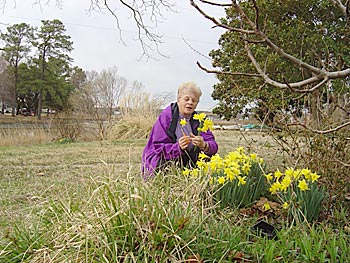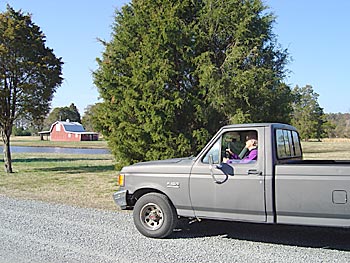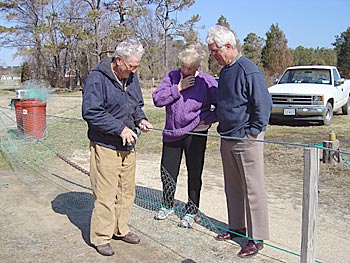Send this e-mail letter to a friend:
Hello Friends,
As nuch as I enjoy Panama, I am happy to be back at my home on the Chesapeake Bay. Three months in the tropics have thinned my blood and I am feeling the cold, but it will not take long for me to adjust.
As I forecast last week, there is much to do in the garden. Malcolm and I spent most of the weekend clearing some of the remaining debris from Hurricane Isabel. Objects carried by the floodwaters from other homes kept appearing. Malcolm found an unopened can of Bud Light when clearing a pile of driftwood, along with an almost new man's shoe.
The grass is still predominantly brown from the excessive cold of the past winter, but thankfully the daffodils are flooding areas with brilliant yellow. When I look closely at the trees and shrubs, I see buds forming, giving the promise of good things to come. Spring is an exciting time for me. With leaves not yet formed, I see beyond the trees to the landscape.
Pat delights in the daffodils as a sign that Spring is near.With Malcolm’s knee still too painful to engage in heavy activity, I have been doing the driving of his Ford F150 truck with its manual drive and heavy clutch. We have shifted several truckloads of debris and are getting ready for a mammoth bonfire.
In a break from yard work, we visited our neighbor Gilbert Hall. Every morning when we are in Mathews, Malcolm goes over to Gilbert's to have a cup of tea and a yarn, while I stay home to make my espresso coffee.
Gilbert will be eighty in June. After retiring from fishing he took to hanging fishing nets for other watermen (fishermen). Hanging a net is the term for making a net. He sews the nylon net to a line top and bottom, placing floats on the top and lead weights on the bottom. He works at an amazing speed, and because he is one of only a few who still hang nets, he is never out of work.
Both Malcolm and I feel enriched by Gilbert's positive attitude toward life and his innate sense of fun. The fact that he is ten years older than us and still has a twinkle in his eye helps keep us thinking young.
Pat at the wheel of the Ford F150.A couple of years ago, Gilbert broke sixty years of silence and started to tell Malcolm about his experiences on a destroyer in the Pacific, experiences he had never related to his family. Malcolm wrote about them in an article that was published in our local newspaper, The Gazette-Journal. I am having the article added to the end of this letter because Gilbert's war record was remarkable on a number of accounts and some of you may be interested in reading about it.
For the first time this year, I am not showing you a painting this week. This does not mean that I have not been painting but rather, because of the travel, I have no work that is ready for showing. Most of my painting time has been taken up on starting a new West Virginia painting.
I was not happy with the West Virginia painting I showed you last week. When I am not one hundred percent pleased with the way a scene is turning out, I have no alternative but to start again. If I were not to, the painting would haunt me in the months to come. Next week, I will show you the new one, and I think you will agree that I made the right decision.
There was a Dutch seventeenth century painter named Van de Cappelle. It is said that he destroyed more paintings than he sold because he could not bear the thought of the public seeing a painting of his that was not perfect. I can understand his feelings.
On Thursday I will be attending a gala at the Museum in Waynesboro to mark the unveiling of a painting I have created for the public television station WVPT. At the moment the painting is under wraps, so you will not see the image until next week.
On Friday, Malcolm and I fly to St. Petersburg where we will be joined by my sister Mary Martin and her husband Bill and my brother Dan Buckley and his wife Carol. On March 27 and 28, I will be at the opening of Tim Finn's gallery, which has taken over representing me in the area.
Pat and Malcolm watch as Gilbert hangs a fishing net.The big excitement looming is the Tennessee Convention, sponsored by the Society. If you are in striking distance of Kingsport and have not already marked your calendars, please do so now. The dates are Friday and Saturday, May 7th and 8th. I promise you, this is going to be a fun event. For the adventurous, the dress for the dinner dance will be ’50’s style and much of the music will be of that era. Also, don't forget the Museum and Barn Open House during the weekend of April 23-25.
Until next week, when I will write to you from Florida.
Love,
Pat
One Man’s War:
Gilbert Hall joined the crew of the USS Lawrence C. Taylor, Destroyer Escort 415, in Norfolk, Virginia, shortly before his 19th birthday in 1944. Soon after, the destroyer sailed to join the Pacific Fleet. As the ship approached the coast of Panama, Seaman Hall was called to the bridge and appointed acting helmsman. He remained acting helmsman until the war ended eighteen months later.
"They called for me to go to the bridge when they read in my records that I had fished pound nets before joining the navy. There was a big difference between steering a fifty-foot fish boat and steering a destroyer. You have a whole lot more boat, and you cannot give it too much rudder or it will turn more than you want."
"On one occasion, I had to steer the destroyer while we transferred an admiral from our ship by breeches buoy to a ship sailing alongside. I don’t know who was the most scared, me or the admiral. I had to keep the ship exactly on the degree."
In addition to being a helmsman, Gilbert had another, less pleasant job. He and another sailor had the task of sewing canvas around the bodies of those who died while the ship was at sea.
Gilbert explains, "I got to know a Mr. Peters in the wheel house. He was a lieutenant and had been in the Merchant Marines before the war. He and I would talk about fishing, and he taught me how to sew canvas sails. Little did I know that this would later mean that I had to sew the canvas around the bodies of the men who died. Me and another boy would work together, he on one side of the body and I on the other. Before completing the stitching, we would put a 50 lb. shell in with the body to weigh it down when we sent it over the side."
In 1945, while acting as escort in the 3rd Fleet, the Lawrence C. Taylor, along with the other ships, was caught in a typhoon.
"The storm lasted for two days and nights, with one day the height of it. I was in the wheel house eight hours on and eight hours off throughout. We were supposed to have three helmsmen, but we didn't’t have but two. They could not find another."
"The wind speed was 130 knots (150 mph) and the seas 60 feet high, great long swells, and on the top of each swell there was a big sea coming at another angle. I had to keep head to the wind. The rudders were useless, the seas were so bad. I had to hold the wheel dead center while the quartermasters steered with the engines, one ahead and the other aback. I had never worked so hard, not even on the heaviest pound nets, and I was scared to death, too. That was the worst part of it."
"Twice we rolled to 47 degrees, two degrees more than the ship was supposed to stand. The ship just laid there on her side for what seemed like forever, as if she would never come back. I thought we were gone for sure. I remember looking at the captain. We were all silent and he, like us, could do nothing but wait and see which way we would go. We were lucky. Others weren't."
"Six other destroyers similar to ours capsized. Among those lost in the storm were two Mathews boys, good friends of mine, Dickie Staunton and Wendell Hudgins. I was told that only one man out of the six crews was rescued. It must have been some miracle. They say he came to Mathews after the war to see Dickie and Wendell's parents."
The escort duties of the USS Lawrence C. Taylor included hunting for Japanese submarines. "We destroyed two Jap subs," Gilbert recalls. "One was at 60 feet and the other at 400 feet. On both occasions, we were given two bottles of beer each to celebrate. The beer was supposed to be for when we went ashore after an island was taken, but it was broken into for these occasions."
"I gave my beer away. It is not that I didn't like a drink as much as any other sailor. I could not swallow it to save my life. It was so sad. Photographs of families with children and books and the like would float up to the surface. I made myself remember that if it had not been them, it would have been us. It's the one who gets the first lick that lives. Nevertheless, I could not join in the cheering for thinking of them and their families."
The list of actions in which the Lawrence C. Taylor played a part follows the progress of the U.S. forces as they pushed the Japanese back across the Pacific: the invasion of Mindoro; air strikes on Formosa and Luzon; the support of General Douglas MacArthur’s landings at Lingayen Gulf; and the assault on Iwo Jima, which lasted from February 14 until March 10, 1945. Gilbert was awarded seven battle stars, five for invasions and two for sinking the submarines. "I never did get a battle star for the typhoon," laughs Gilbert. "But, I reckon that was the nearest I came to death."
"At Iwo Jima we were an escort to the aircraft carriers. I was on the bridge when the kamikaze pilots attacked the USS Bismarck Sea, a converted Victory Ship. We were close by. The sun had just gone down, and our planes had returned to the carrier. I saw the tracers fired by the kamikaze pilots as they approached and reported to the bridge officer. There was nothing we could do but stand by and watch. The planes came in wide open. There was a massive explosion, and the ship went end first beneath the waves."
"We picked up 120 sailors from the carrier’s crew, many of them in a pitiful state. We had no real doctor on board, only the pharmacist mate. I heard it told that he amputated injured limbs with the machine shop hacksaw and with the butcher’s cleaver--to stop gangrene I suspect—but, even then, two of them died quickly and soon after we sewed their remains in canvas and slid them over the side."
The final action of the Lawrence C. Taylor was the assault and subsequent defense of Okinawa Island, as a unit of Carrier Support Group 4.
Gilbert was twenty-one when the war ended. The Lawrence C. Taylor was then given another mission. It was assigned to carry General Chang Kai Shek along the coast of Manchuria and China. It was a last attempt by the General to rally his nationalist army in the closing stages of his war with the Red Army.
At the helm of the launch carrying General Chang Kai Shek towards the Manchurian Coast stood acting coxman Seaman Hall. "Someone fired a shot across our bows. The shot was too close for comfort, I tell you that, about as far as from here to that house." Gilbert pointed to his daughter’s house two hundred feet away. "The General told me to go about."
Gilbert was one of two seaman who had been appointed acting coxman. Early on, the other seaman had taken a short cut across a reef and ripped the rudder off. "After that, the General always asked for me,"
Gilbert relates, "I took Chang Kai Shek ashore many times in different places along the coast. He was real friendly and would stand beside me as we made our way through the channels. Often his son was with him. They were nice looking, both of them, the old man and his son. They were taller than most Chinese, the son was particularly tall. They would talk to me on the deck of the ship also. They were interested to know about fishing and what life was like back in Mathews."
Gilbert’s naval record shows that he is a member of the Ancient Order of the Golden Dragon and of the Silent Mysteries of the East. He does not recall how he came to have these awards or anyone ever giving them to him. Maybe they came from the General.
When the mission with the General ended, the Lawrence C. Taylor headed for home. "We brought the ship to Frisco, and from there most of us were sent by train all the way back to Norfolk. The journey took a whole week. I felt sorry for the one MP who was responsible for our carriage. Many of us were drunk most of the time. The poor fellow was scared to hell of us. He told his lieutenant there was no way he was going to mess with us. We stopped for a while in Kentucky, and some of the sailors met up with local girls there and never did get back on the train. I grew up a great deal in those eighteen months. I never did leave Mathews after I got home. I was so thankful the Lord spared me. For ten years I had nightmares, and for many more years I could not bring myself to think of all that I had seen and experienced. Only recently could I start to reflect back on those days."
The Moss
Portfolio
HC 69 Box 17118 Poplar Grove Lane
Mathews, VA 23109
(800) 430-1320
©P. Buckley Moss 2004


